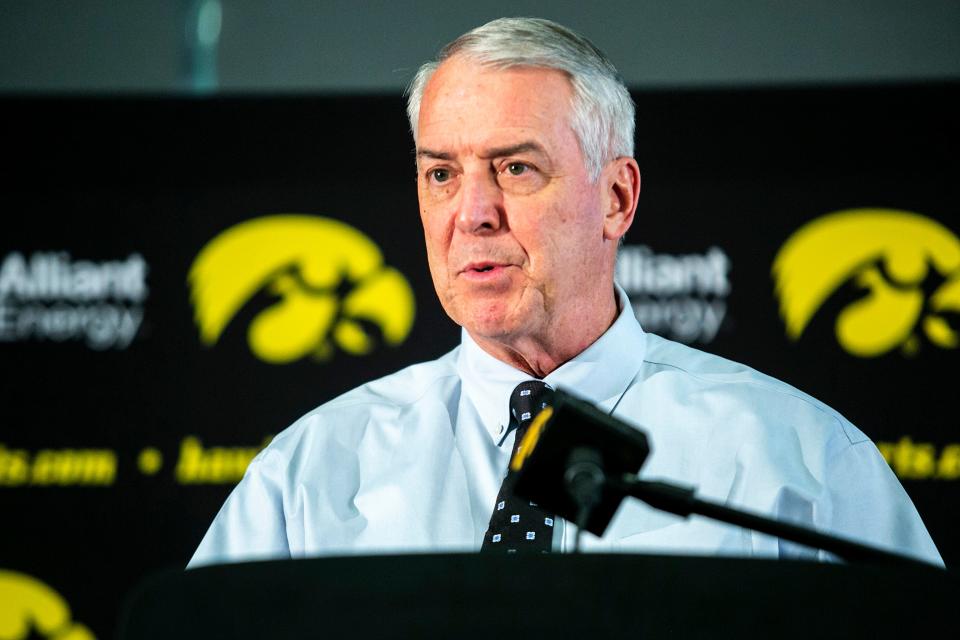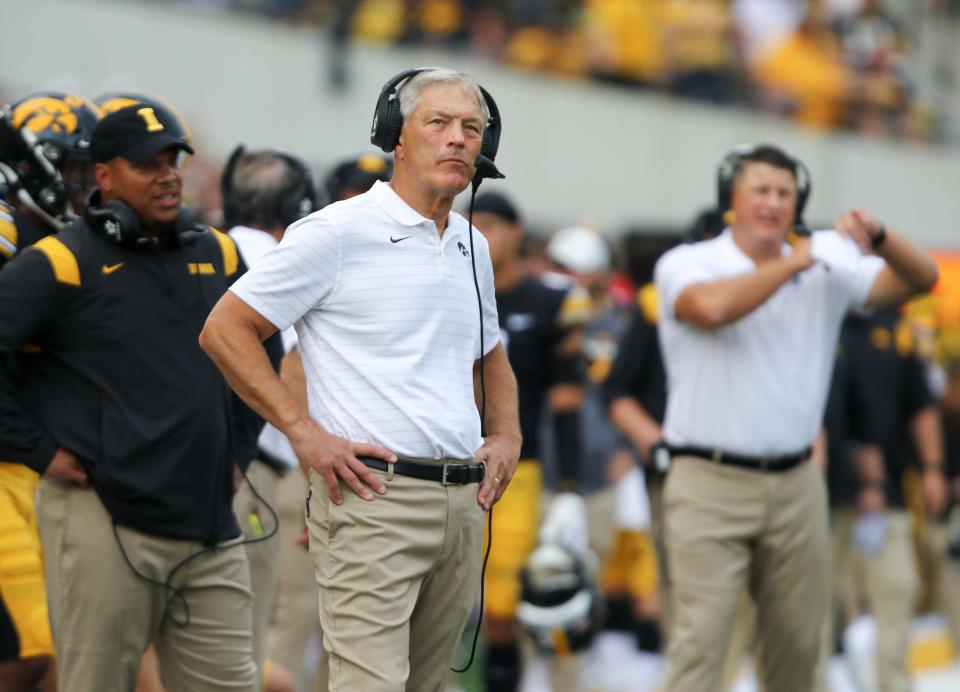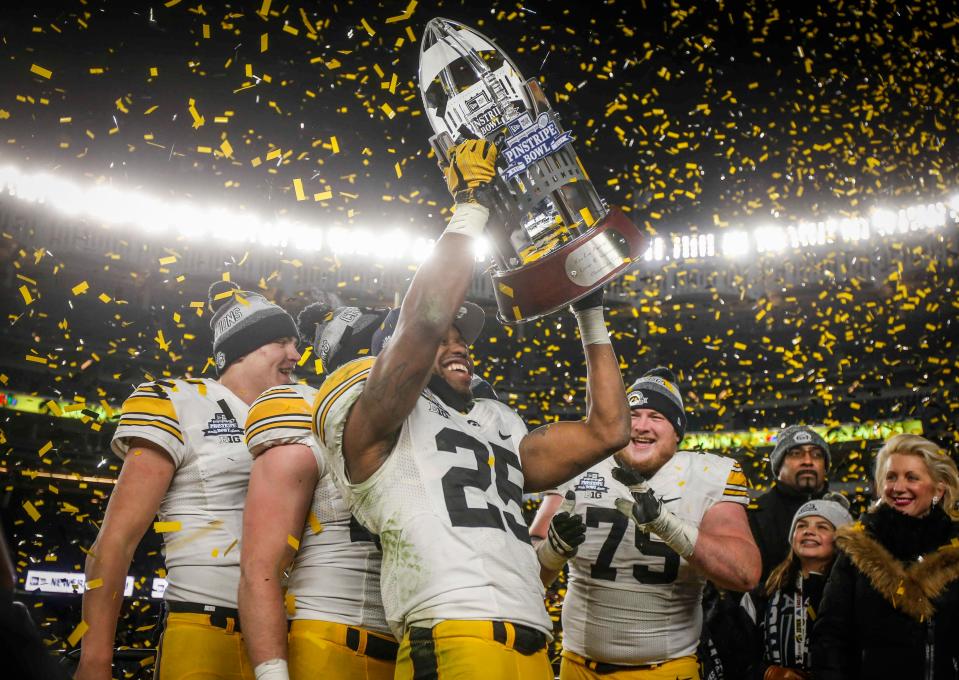$4M settlement reached in Iowa football discrimination suit; auditor wants AD Gary Barta out
A $4.175 million settlement agreement has been reached in the lawsuit filed by a group of Black former University of Iowa football players who claimed head coach Kirk Ferentz oversaw a racially discriminatory culture.
The Iowa Department of Management’s State Appeal Board was expected to vote on the settlement Monday afternoon, which would have the Iowa athletics department paying out $2.175 million and the state picking up the remainder.
Iowa State Auditor Rob Sand, one of the three appeal board members, said Monday morning he would oppose using taxpayer funds for the settlement unless Iowa athletics director Gary Barta was ousted.
STAY UP-TO-DATE: Subscribe to our Sports newsletter now!
Why does Iowa State Auditor oppose the lawsuit settlement?
The State Appeal Board is a three-member board comprised of the auditor of state, treasurer of state, and director of the department. The board approves or rejects, and pays claims against the state or a state employee, and resolves local budget protests.
"Under Gary Barta’s leadership at the University of Iowa Athletics Department, we’ve had the Peter Gray scandal plus three instances of discrimination totaling nearly $7 million in damages (setting aside other suits)," Sand said in a statement to other settlement board members.

"After the largest settlement (referring to a $6.5 million payout from the discrimination lawsuit surrounding the 2014 firing of former field hockey coach Tracey Greisbaum and retaliation against her partner, Jane Meyer), Barta asserted no wrong was done. Now we have a new matter for $4 million more, and for the first time they want part paid from the taxpayers’ general fund, even though they now collect tens of millions annually thru the Big Ten TV deal.
"Enough is enough. Clear personal accountability is necessary. I will not support taxpayers funding this settlement unless Gary Barta is no longer employed at the university and forfeits any severance or similar pay. I encourage you to join me. Real accountability will help prevent discrimination, protecting both taxpayers and future victims."
What's in the Iowa football discrimination lawsuit settlement?
The key settlement details are as follows:
The state of Iowa was on the hook to pay $2 million to the plaintiffs, with the Iowa athletics department being responsible for the remaining $2.175 million.
About 45.5% of the settlement will go toward attorney's fees of $1,878,750. Another $35,837.41 will go toward unspecified costs. The firm of Tulsa-based civil rights attorney Damario Solomon-Simmons, who was lead counsel for the former players, will be paid the full settlement amount.
Twelve former players signed the settlement agreement Feb. 23:
Akrum Wadley (a former star running back who played at Iowa from 2013 to '17)
Jonathan Parker (2013-16)
Marcel Joly (2014-17)
Aaron Mends (2014-18)
Maurice Fleming (2012-15)
Reggie Spearman (2013)
Kevonte Martin-Manley (2010-14)
Darian Cooper (2011-16)
Laron Taylor (2012-14)
Brandon Simon (2016-19)
Javon Foy (2019-20), and
Terrence Harris (2014-16).
There were 13 players on the initial lawsuit filed in November of 2020, but Andre Harris' name was not included in the settlement for reasons not immediately known. Those 12 players would presumably share the remaining $2,210,412.59 – which amounts to roughly $184,201.05 per player.
The University of Iowa also will commit $90,000 toward the suing players to obtain graduate school degrees. They would not be required to attend the UI.
The university also agreed to support mental-health costs for the 12 former players for one year, through March 15, 2024.
The agreement also stipulates that the university will hire the services of Leonard Moore, a former vice president for diversity at the University of Texas, through at least May 2024 to assist Iowa's five-year Diversity, Equity and Inclusion (DEI) plan.
"The athletic department remains committed to providing an inclusive and welcoming environment for every student-athlete and staff member involved in our program," Barta said in a statement provided to the Des Moines Register. "The Hawkeyes' over-arching goal to win every time we compete, graduate every student-athlete that comes to Iowa, and to do it right, remains our focus."
Lawsuit stemmed from allegations of mistreatment in Iowa football program
If approved, Monday's potential settlement would end the legal chapter of what became a national news story on June 5, 2020, when dozens of former players used social media to share their stories of alleged mistreatment under the watch of Ferentz, the longest-tenured active coach at college football's top level.
The outcry led to the ousting of longtime strength and conditioning coach Chris Doyle through a $1.1 million separation agreement and an outside investigation led by law firm Husch Blackwell, which found that "the program’s rules perpetuated racial or cultural biases and diminished the value of cultural diversity."

That report became the basis for Solomon-Simmons (a former Oklahoma football player) to lead 13 former players in a suit filed Nov. 13, 2020, that named as defendants the UI; the Board of Regents; Barta; Ferentz and his son, Brian (the Hawkeyes’ offensive coordinator); Doyle; and current strength coach Raimond Braithwaite.
The players requested $20 million in damages, demanded the firings of Barta and both Ferentzes and sought other measures aimed at improving the treatment of Black players at Iowa.
What led to the University of Iowa football lawsuit settlement agreement?
Over the course of two-plus years, many key moments pointed to Monday’s settlement agreement.
The first big development was a 21-page ruling in May 2021 by Judge Stephanie Rose that removed Barta, Braithwaite and Kirk Ferentz as defendants; dismissed six of the eight counts; and trimmed the number of plaintiffs from 13 to seven, saying ex-players Fleming, Andre Harris, Terrence Harris, Martin-Manley, Spearman and Taylor were outside the four-year statute of limitations to sue.
While many aspects of that development favored Kirk Ferentz, the players’ side also claimed victory because two counts of the federal lawsuit (Count I, overseeing a racially hostile environment, and Count IV, deprivation of civil rights) were allowed to continue and put more scrutiny on the behaviors of Doyle and Brian Ferentz.
At the time, Oregon-based sports-conflict resolution expert Joshua Gordon looked over the case and told the Register. "I still think this will end with (a) settlement, ultimately. (When) you get into an evidentiary battle, you’re talking big money to defend and deal with depositions and discovery."
From May 2021:Judge Stephanie Rose's 21-page response sets stage for case
While Gordon was proven correct, settlement talks didn’t ramp up for another 18 to 20 months as both sides dug in.
Over the ensuing year, the two sides fought over access to university records, including confidential personnel reports from the Husch Blackwell investigation related to Doyle, Kirk Ferentz, Brian Ferentz and linebackers coach Seth Wallace.
The state argued it had already provided 200,000 pages of documents and that personnel reports were protected by attorney-client privilege, but on June 24, 2022, Chief U.S. Magistrate Judge Helen Adams ordered UI to turn over all the materials to Solomon-Simmons and his team.
While that wrangling took place, a filing by the plaintiffs in April 2022 cranked up the heat.
Solomon-Simmons' team filed a second amended complaint with four new counts, including a retaliation claim against Kirk Ferentz over his treatment of Parker, and sought to restore Barta and Ferentz as defendants while adding Wallace.
A secretly recorded meeting by Parker between him and Ferentz was included in the defense team's public filings. The recording shed light on Ferentz inquiring whether Parker had "both feet in the circle" of the program and the coach assigning Parker four hours of community service for throwing a ball toward Brian Ferentz during a special-teams drill.
From April 2022:Damario Solomon-Simmons speaks with Register after new developments
A final push, then football season
After the order for the UI to turn over all materials, the defense team continued to push Rose to dismiss the case, while the plaintiffs argued that key UI personnel were hiding behind their legal team to avoid depositions.
In August 2022, Brian Ferentz’s voice was heard through a 537-page filing as he outlined the complaints against him from all seven players, with Wadley being the most prominent. Wadley is Iowa’s No. 5 all-time leading rusher and left the program after the 2017 season with 35 career touchdowns, one shy of Tavian Banks’ school record.
Wadley sued Brian Ferentz for $20 million, saying the coach tarnished his reputation. Brian Ferentz replied in his filing that Wadley stopped going to class, thinking he would be taken in the 2018 NFL Draft.

As stated in the filing, "Based on 20 years of playing and coaching, B. Ferentz believes that if Wadley were good enough to play professional football, he would have played or be playing, regardless of anything B. Ferentz said or his silence."
Then in September 2022, Doyle submitted his own request for a summary judgment and included testimonials of support from more than a dozen people, including nine who are Black and played in the NFL. That list included prominent NFL players such as Mike Daniels, Noah Fant, Micah Hyde, Desmond King and Tristan Wirfs.
Doyle also went through the contentions of each player suing him, including Wadley. The filing stated, "Mr. Wadley acknowledged under oath that Doyle never used the ‘n’ word, and never said anything about his hair, jewelry, tattoos other than Wadley’s belief that neither Doyle nor Coach Kirk Ferentz liked players wearing hoodies."
Then came the rigors of a football season and an even greater spotlight on the Ferentzes, as Brian Ferentz's offense produced the program's worst yardage totals since 1978. Meantime, the legal waiting continued, with depositions for Kirk and Brian Ferentz still on hold.
In a Dec. 14 filing, both parties requested additional time to file motions to compel and resolve outstanding issues with the discovery process. The original trial date of March 6 was pushed back, and on Feb. 25 the plaintiffs removed Wallace from the case (no specific racial-bias claims ever surfaced about him) "with prejudice," meaning he could not be re-added to the lawsuit.
Three days later, on Feb. 28, the Ferentzes, Doyle and Barta were removed "without prejudice," meaning they could be re-added to the suit, but their removal proved to be a strong indication that a settlement was near.
By taking them off the case, the power of reaching a settlement lay with the University of Iowa and Board of Regents.
That settlement agreement arrived on Monday.
Hawkeyes columnist Chad Leistikow has covered sports for 28 years with The Des Moines Register, USA TODAY and Iowa City Press-Citizen. Follow @ChadLeistikow on Twitter
This article originally appeared on Des Moines Register: Iowa football racial discrimination lawsuit reaches $4M settlement

